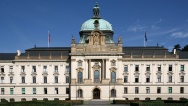Press Advisories
23. 2. 2009 10:13
Conference "EU Enlargement - 5 Years After"
According to the conference we provide you the article of the European Commission :"Five years of an enlarged EU has brought lasting benefits and left Europe better placed to tackle the current crisis"
The recent enlargements of the European Union were a milestone in the process of unifying Europe and have brought benefits to citizens throughout the Union. Economically, enlargement has led to increased living standards in the new Member States, while creating export and investment opportunities for the old ones. It has also helped consolidate democracy, stability and security on our continent. An enlarged EU carries more weight when addressing issues of global importance be it climate change or the world economy and its governance. Five years on the EU is not only bigger, it is also stronger, more dynamic and culturally richer. In the current difficult global context, the big challenge is to resist any temptation of protectionist tendencies that would destroy the huge benefits for citizens brought about by the creation of a border free single market of 500 million people.
“The 2004 and 2007 enlargements were a huge historic step. They put an end to the division of Europe, helped consolidate democracy and brought economic benefits for all EU countries in terms of higher competitiveness, higher economic growth and higher job creation. We should not let the crisis overshadow this uncontested success. United, we can shape the solution to global issues such as climate change or a new international financial governance. Divided we will achieve nothing," said Economic and Monetary Affairs Commissioner Joaquín Almunia
Olli Rehn, Enlargement Commissioner added:" Enlargement has served as an anchor of stability, and driver of democracy and the rule of law in Europe. Economically it has benefitted both new and old member states, as well as the EU as a whole. It has extended the area of peace and prosperity to almost 500 million people and increased our weight in the world."
It has been five years since the EU took in 10 new Members[1[1]] from Central and Eastern Europe, putting an end to several decades of division brought about by the Cold War. Two others, Bulgaria and Romania, joined in 2007. A Communication on “Five Years of an Enlarged EU" shows that the enlargement brought about huge economic benefits for both sides.
The enlarged EU is now the largest integrated economic area in the world, accounting for more than 30% of world GDP and more than 17% of world trade. This enables the EU to be a decisive player in a global world. It can make its voice heard in shaping globalisation for the benefit of citizens.
Income per capita in new Member States has risen from 40% of the old Member States' average in 1999 to 52% in 2008 and growth averaged 5.5% from 2004-2008 compared to 3.5 % in 1999-2003. But this has not been at the expense of old Member States, whose growth was around 2.2% annually from 2004-2008, with a similar figure for 1999-2003.
Enlargement also increased trade opportunities. In 2007, almost 80% of exports of the new Member States went to the rest of the EU. Old Member States also saw their sales to the new members increase to around 7.5% of their total exports in 2007, from 4 ¾ % a decade ago.
Unemployment in new Member States has declined from often very high levels to levels similar to those in the rest of the EU – around 7% in 2007. Concerns in old Member States about massive labour migration have not materialised. In most host Member States the number of migrant workers has not exceeded 1% of the "home" working age population and enabled labour shortages to be filled. Temporariness has been a strong feature of most of this migration – in the UK 50% of recent migrants have returned to their countries of origin.
The current global crisis is creating difficulties for all countries, including in the EU, and unemployment is rising everywhere.
But a big, united EU is better able to address this and other challenges than if its member states act alone. The EU has taken coordinated action to stabilise the banking system and to help the economic recovery. These measures, completed by others under preparation, more importantly to restore the crucial credit channel to the economy, allow us to envisage a gradual recovery from the end of this year.
New Member States currently experiencing a sharp growth slowdown are supported by the significant funds available under the EU's Cohesion Policy. The Balance of Payments facility allows the EU to come to the rescue of Member States outside the euro area that need temporary assistance.
The common competition and state aid rules will ensure a level playing field for firms.
The Lisbon Strategy for Growth and Jobs helps identify those reforms that will increase our economies' growth potential and will make them more resilient in the face of global shocks.
The Commission is working with Member States to re-programme the European Social Fund to help keep people in employment in Member States old and new. The Commission is also working to reduce the broader social impact of the crisis including through the Globalization Adjustment Fund.
The reformed Stability and Growth Pact provides a solid framework that allows us to stimulate demand and job creation in the short term, while holding the course for sound and sustainable public finances in the medium and long-term.
Full Communication and analytical report available on:
http://ec.europa.eu/economy_finance/thematic_articles/article13913_en.htm






